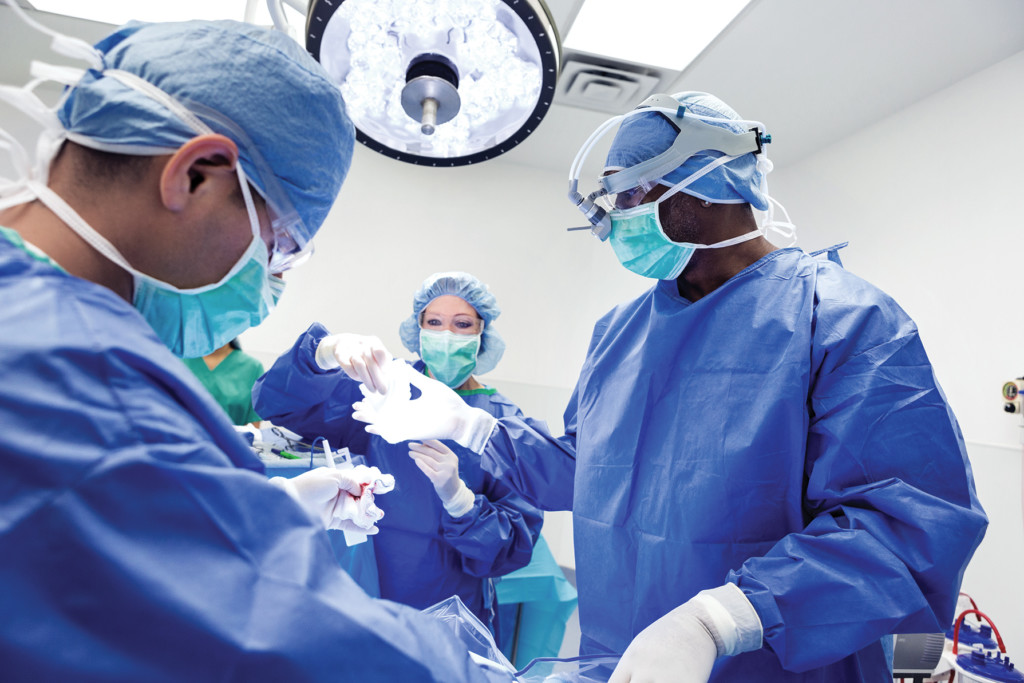Request Information
The operating room hums with tension. A surgeon is painstakingly operating on a patient. The room is full of medical personnel who all serve important purposes. And you’re there, in the middle of the action.
Does that sound like an exciting and fulfilling career? Then you may be looking to become a surgical technologist. Surgical technologists serve an important role in hospitals and surgical centers, working under the supervision of doctors, nurses or other surgical personnel to make sure the operating room is ideal for surgery.
This career guide will teach you how to become a surgical technologist, job outlook, surgical technologist certifications and how to look for a school for surgical tech.
What is a Surgical Tech?
Surgical technologists are members of the operating room who prepare the room by setting up instruments, equipment and sterile drapes. They may also prepare patients for surgery by cleansing surgical sites as well as helping the operating staff put on sterile gowns and gloves.
During surgery, surgical technologists may pass instruments or other supplies to surgeons and surgical assistants. They may also prepare specimens for laboratory analysis.
When researching surgical technology, you may be confused by what is a surgical technologist vs surgical technician. A surgical technician typically reports to a surgical technologist. They may have more on-the-job training compared to a surgical technologist’s formal education. They also help sterilize surgical instruments and help prepare patients for surgery.2
Why Become a Surgical Technologist
Overall, joining the health care industry may be a smart idea. Potential growth for the surgical technologist job field may happen due to advances in medicine that have made surgery safer and more effective. Additionally, both the large baby boomer population in the U.S. as well as an aging population in general both require more medical care and are more willing to undergo surgery now than in previous generations.
Best States to Work as a Surgical Technologist
As mentioned, geographic area can impact both the number of surgical technologist jobs available and their salaries.
According to the BLS, states with the highest employment level for surgical technologists in May 2022 were:1
| State | Employment | Employment per thousand jobs |
|---|---|---|
| California | 10,810 | 0.61 |
| Texas | 9,110 | 0.70 |
| Florida | 8,750 | 0.95 |
| New York | 5,700 | 0.63 |
| Michigan | 3,950 | 0.93 |
Start Your Career in Surgical Technology
Carrington College focuses on small class sizes and hands-on training. Here you’re more than a face in a room. Take the first step on your way to a new career in surgical technology.
What Does a Surgical Tech Do?
Surgical technologists play a vital role on a healthcare team. Keeping surgical equipment and operators sterile is a very important job. Surgical technologists help maintain a sterile environment in hopes of reducing postoperative infections in patients.
According to the BLS, some typical surgical technologist job duties may include:2
- Prepare operating rooms for surgery
- Sterilize equipment and make sure that there are adequate supplies for surgery
- Ready patients for surgery, such as by washing and disinfecting incision sites
- Help surgeons during surgery by passing them instruments and other sterile supplies
- Count supplies, such as surgical instruments, to ensure that no foreign objects are retained in patients
- Maintain a sterile environment to prevent patient infection

Skills for Surgical Technologists
While many surgical technologist skills, such as how to drape an operating table or sterilize equipment, can be learned in surgical tech programs, there are some so-called “soft skills” that can help you succeed in this career. According to O*NET Online, which is operated by the U.S. Department of Labor/Employment and Training Administration, some skills that make one a good fit for surgical technology include:3
- Monitoring— Monitoring/Assessing performance of yourself, other individuals, or organizations to make improvements or take corrective action.
- Active Listening— Giving full attention to what other people are saying, taking time to understand the points being made, asking questions as appropriate, and not interrupting at inappropriate times.
- Coordination— Adjusting actions in relation to others’ actions.
- Critical Thinking — Using logic and reasoning to identify the strengths and weaknesses of alternative solutions, conclusions or approaches to problems.
- Speaking — Talking to others to convey information effectively.
- Time Management — Managing one’s own time and the time of others.
- Active Learning — Understanding the implications of new information for both current and future problem-solving and decision-making.
- Complex Problem Solving — Identifying complex problems and reviewing related information to develop and evaluate options and implement solutions.
- Instructing— Teaching others how to do something.
- Judgment and Decision Making — Considering the relative costs and benefits of potential actions to choose the most appropriate one.
- Learning Strategies— Selecting and using training/instructional methods and procedures appropriate for the situation when learning or teaching new things.
- Reading Comprehension— Understanding written sentences and paragraphs in work-related documents.
- Service Orientation— Actively looking for ways to help people.
- Social Perceptiveness— Being aware of others’ reactions and understanding why they react as they do.
Surgical Technologist Career Path
Once you become a surgical tech, there are many opportunities to grow. You may consider specializing in a particular surgical branch instead of assisting as a surgical technician. There are a number of specialties you can consider including:4
- Anesthesia
- Heart surgery
- Neurosurgery
- Organ transplantation
- Pharmacology
- Plastic surgery
- Sterilization
- Wound preparation
These different specialties may require additional education, training, certifications and licenses.
You may also choose to pursue other paths of advancement outside of the general surgical tech jobs.4 Among the options open to surgical tech are:
- First assistant. These are the primary surgical technicians in an operating room who perform more advanced duties.
- Management or administration. Surgical techs work with teams and have first-hand knowledge of what surgical teams need. Along with some business training, this can open up management positions.
- Private companies. Surgical techs may be able to seek positions with insurance companies, operating equipment firms and other companies that work with surgeons and surgery needs.
How to Become a Surgical Tech
If you are considering becoming a surgical technologist, there are a few steps you should take.
- Obtain a high school diploma or GED. Completing primary education is your first step in how to become a surgical tech.
- Research surgical tech schools. You’ll want to find the right Surgical Technology program that fits your needs. Maybe you want flexible class schedules or a quick completion time. We’ll discuss what to look for in a surgical technology program below.
- Enroll in a surgical tech program. After researching what the best school for you is, undergo the application process and get back in the classroom.
- Find a surgical technologist job. You’re ready to enter the workforce! Apply to employers in your area and start getting on-the-job training.
How Long Does it Take to Become a Surgical Tech?
The Surgical Technology program at Carrington College can be completed inas little as 15 months. This option helps you get into the workforce quickly and could reduce the amount you need to spend on education.
Discover Your Career in Surgical Technology
Carrington College’s Surgical Technology Program offers you the hands-on training you need for a job in surgical technology. Take the first step on your way to a new career.
What to Look for in a Surgical Technology Program
Choosing the right school to pursue surgical technology is a big decision. The right training can open doors for better jobs and possibly a better salary down the line. While many institutions may offer surgical tech programs, it’s important that you look for the one that fits your goals and lifestyle.
A few core things to look for when considering Surgical Technology programs include:
- Small class sizes. When learning to be a surgical technologist you want individual attention from your instructor.
- Hands-on training. When dealing with tasks like sterilizing equipment and prepping patients, it’s important that you have time to practice those skills hands-on.
- Externships or career training. Most programs include an opportunity to learn in the real world before you even graduate. You’ll gain an impressive experience that looks great on your resume.
- Education is a major investment, but it’s an investment in your future. At Carrington College and many other institutions, we participate in most financial assistance programs, both federal and state, as well as private financing. Student loans, grants, and scholarships are available to those who qualify. For complete information on current tuition costs, please see the academic catalog.
Can I attend a surgical technologist program online?
While some programs may advertise surgical technologist programs online, they may be misleading. Surgical technology is a hands-on career. You need to practice skills like preparing operating rooms for surgery and sterilizing equipment and tracking adequate supplies for surgery. Therefore it is unlikely you can get a full surgical tech education online. There should be some lab portion of your education.
What Will I Learn in Carrington College’s Surgical Technology Program?
Carrington College’s Surgical Technology program includes the academic and clinical instruction necessary to perform the duties of a surgical technologist. At Carrington, you will study microbiology, anatomy, physiology, pharmacology, surgical procedures, instrumentation and techniques, preoperative and post-operative routines and care of surgical patients. Students are expected to participate in a minimum of 120 surgical cases by the end of the program.
Some examples of courses you would take at Carrington College include:
- H Introduction to Surgical Technology
- H Basic Surgical Procedures
Our Faculty
The faculty in Carrington College’s Surgical Technology program are people who have real-world experience working in the field of surgical technology. They are able to guide students through the best process to excel in this field.
Our Students
Students at Carrington college come from all walks of life. Whether you’re a recent high-school graduate looking for secondary education or a later-in-life student looking to make a career change, you’ll fit right in at Carrington college.
Learn More About Surgical Technology
Surgical technology is an exciting career in health care that you can get started in fast. Carrington College offers Surgical Technology at two campuses: Phoenix, Arizona and San Jose, California.
To learn more about how you can get started in Surgical Technology, request more information.
Updated:
February 13, 2023
